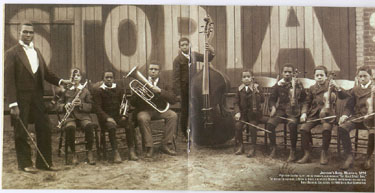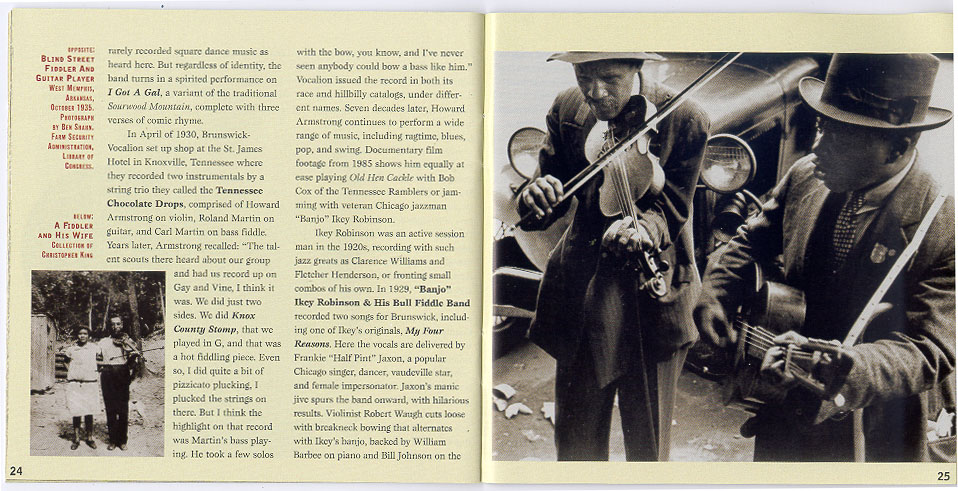


It's a funny thing. As we embark further on our journey into the new century, we are just now starting to rediscover all the long-forgotten, wonderful things about the 20th. Whether it's bluegrass or early jazz, many music lovers have developed a growing fondness for the musical styles of yesteryear. The result has been a slow but growing interest in older recorded music, music trapped on old 78 RPM records, just waiting to be unleashed by modern technology.
Enter Marshall Wyatt. His Old Hat label seeks out obscure vintage tunes and releases them in compilation form on CD. Old Hat's latest release is a collection of black fiddle music from 1927-1935, entitled "Folks, He Sure Do Pull Some Bow!". It pulls together a mix of blues and early ragtime, resurrecting artists with colorful names like the Memphis Jug Band and the Georgia Yellow Hammers. It opens up a world unknown to our time, taking us back to the basic roots of popular entertainment. Yet, it still has impact in the contemporary world, as it is touching in both its humor and its cultural commentary, whether exampled in the silly comedy of Peg Leg Howell's Moanin' And Groanin' Blues or the ugly racial divide described in Bo Chatham's (aka Bo Carter) Good Old Turnip Greens.
So how does Wyatt go about giving this music new life? We ask him about his mission and the love he has for the music of long ago...

Tell me about Old Hat--how did it get started and what is the "vision" of the label?
I never set out to start a record label, but things evolved that way. I started buying 78s at flea markets about 30 years ago, but I didn't get serious about it until the 1980s. Eventually my interest in the old music motivated me to seek out some of the older musicians- the guys who had made those records back in the '20s. I did a lot of research and interviews up in the mountains of North Carolina, around Ashe and Allegheny Counties. The people I met had great stories to tell, and their old recordings were absolutely fabulous. But most of the music had never been reissued, certainly not on CD, it was not available to a modern audience. So that was my motivation to put together my first collection. That was in 1997. For my CD compilations, I want to focus on areas that have not been fully explored, to fill in a few gaps not covered by other reissue labels. I also hope to give the music some historical context based on solid research. To give another example, I love black stringband music, and I realized that nobody had specifically done a collection of black fiddlers. So now I've helped fill that gap. Actually, there was one European LP from about 30 years ago that featured black fiddlers, but it's tough to find that LP. It's rarer than some of the 78s!
How do you choose songs to go on your compilations?
I've listened to a lot of records, original 78s whenever possible, but I also own a lot of LPs that reissue older music, and I have tapes of really obscure stuff from other collectors. And I've developed certain preferences over the years. Once I have a general concept for a compilation, I start trying different combinations of songs and different sequences. Technically, this process is now a lot easier with a CD recorder than it was with a cassette deck- but the actual decisions are just as difficult. It takes weeks to figure it out- and then of course I have to start tracking down the best possible copies of the original 78s, which is another process altogether.
Your website says you buy 78 records---what exactly are you looking for?
The good stuff, naturally. String bands, blues, gospel, jazz, hillbilly, and ethnic records from the late 1920s/early 1930s. Possibly some pop and dance band material from the same era. Of course condition is a major factor that affects the desirability of any record.
I see in the liner notes of "Folks" that Joe Bussard donated some of his music---we interviewed him not long ago about his website---that guy is a character. Do you work together often? Are all 78 collectors that crazy?
Joe is always ready to help out at a moment's notice- he doesn't beat around the bush. He's got one of the greatest 78 collections on earth, and he's always been willing to share the music. Not only that, he's highly entertaining, a true raconteur with some of the best record-collecting stories you'll ever hear. Collecting 78s is a disease, no doubt about it, but Joe transforms that disease into a positive experience. The next Old Hat CD will be a Joe Bussard "sampler"- 24 tracks representing the major genres of his collection. It's called "Down In The Basement." (That's where he keeps the collection of course.) The CD package will showcase Joe, too, with pictures and stories. I hope to have it ready by May, but who knows- it always takes longer than I think it will!
Where do you find the fabulous photos? They are just as wonderful as the songs...
Thanks for mentioning that. The pictures are rarely mentioned in reviews, and then only in passing. But for me, they're crucial. For me, they expand the overall cultural experience, sight and sound together. These days, I'm becoming more obsessed with finding old photographs than I am about finding records! Serious 78 collectors have access to most of the music that really interests them- if it's not on their shelf, then from reissues or tapes from other collectors. But photographs- there are still countless pictures out there waiting to be discovered, pictures that nobody's seen! I get pictures from museums and archives, from other collectors, and from older musicians that I interview, or their families. I look at flea markets and antique stores, and I search the web, especially ebay. Stuff turns up. I just got a beautiful collotype of a North African tribesman playing a handmade fiddle, circa 1890! He's dancing and grinning while he plays, and he has really bad teeth. It's great!
There has been somewhat of a revival of early 20th century American music---why do you think that is?
I don't know all the reasons, but one important factor is availability. Only a handful of people are fortunate enough to own the original 78s- but now anybody can hear this music, thanks to reissues. A few labels have been plugging away, doing this for years- I'm thinking primarily of Yazoo Records and County Records. Harry Smith gets a lot of recognition for the reissues he did in the early '50s, but for my money Yazoo and County have done more than anyone else to preserve and disseminate this music. Of course another reason would simply be the undeniable superiority of this old music compared to much of the dross that's being churned out these days!
Are there any artists which are now considered "famous" among enthusiasts?
Everybody in the collecting world has their own favorites, there's rarely a consensus. Charley Patton is getting a lot of press these days, largely because of the Revenant box set, but of course enthusiasts have known about Patton all along.
Who are your personal favorites?
Frank Blevins, without a doubt. He was a great fiddler. He made three records for Columbia back in 1927 and '28, with his band the "Tar Heel Rattlers." The music is not sophisticated in a technical sense, but it's charged with a great depth of feeling. For me, it was breathtaking when I first heard it, and it still is. And Frank was only 16 when he cut those records! I was lucky because I met Frank Blevins and got to know him. Hearing those old 78s led to a very rewarding friendship over a period 12 years. Frank died last July, he was 90. I miss him.
What can we expect next from Old Hat?
Like I said, the Joe Bussard CD is next, "Down In The Basement." After that will be a CD of medicine-show music, then a CD of songs about the "Old South." All of this music will be remastered from the original 78s, and most all of it is from the 1920s and '30s.
